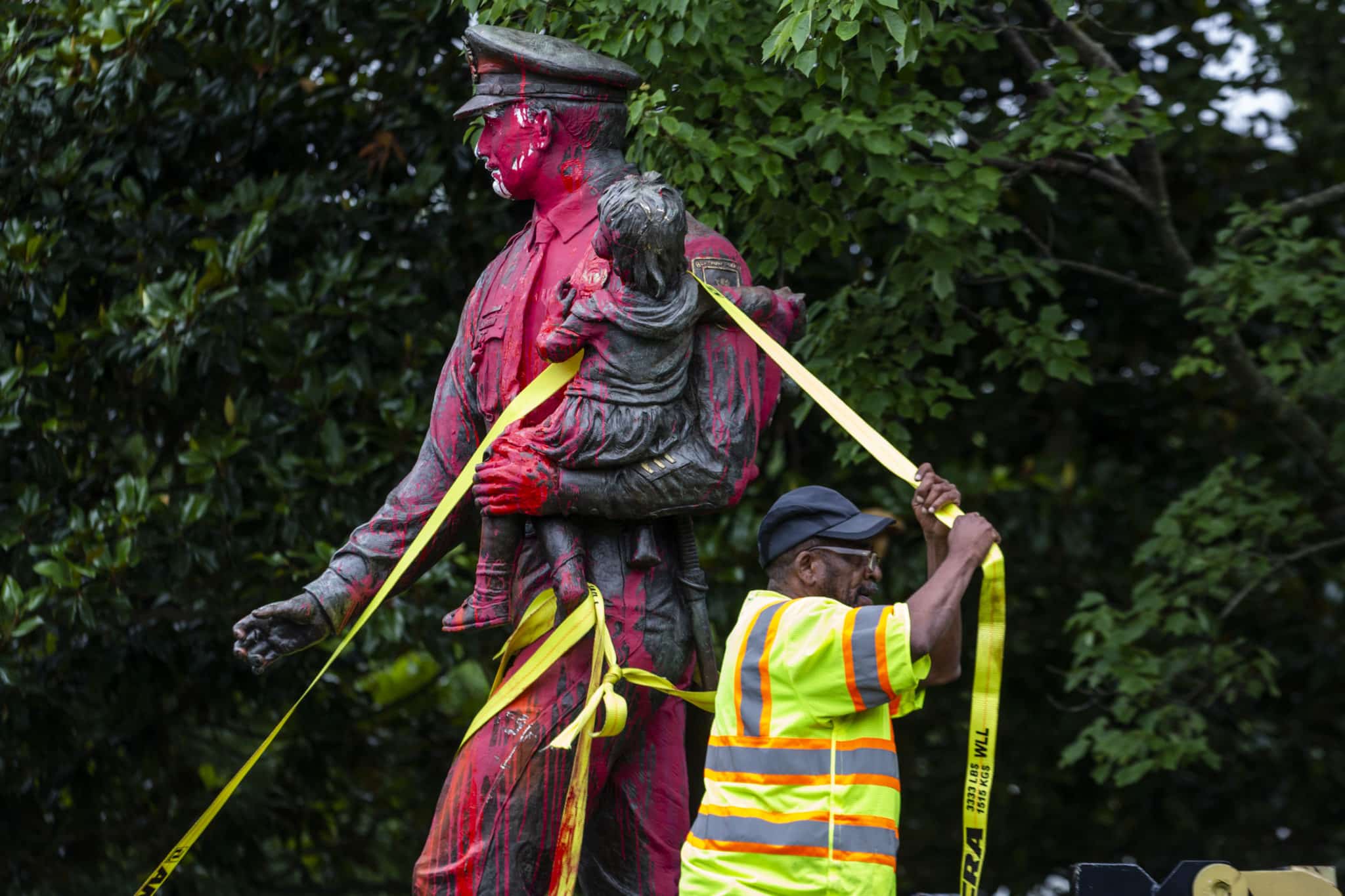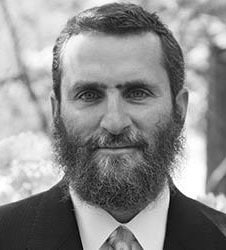 Workers remove a police memorial statue covered in red paint by protesters on June 11, 2020 in Richmond, Virginia. protesters also tore down statues of Christopher Columbus and Jefferson Davis, President of the Confederate States of the America during the Civil War. (Photo by Zach Gibson/Getty Images)
Workers remove a police memorial statue covered in red paint by protesters on June 11, 2020 in Richmond, Virginia. protesters also tore down statues of Christopher Columbus and Jefferson Davis, President of the Confederate States of the America during the Civil War. (Photo by Zach Gibson/Getty Images) Seven-score and 15 years after the last battle of the Civil War, 2020 might be the year that finally drives old Dixie down.
Although vanquished by the Union, the Confederate States of America (CSA) didn’t disappear the way most scotched rebellions do. Instead, the ideas behind the CSA lived on, subsisting off deep pockets of popular sympathy throughout the South. Much of the horror of slavery — the evil that actually pit the South against the Union — would be perpetuated by Jim Crow laws and systemic injustice in certain states, which would live on unfettered for 100 years until the Civil Rights Act of 1964 began their unraveling.
The glory of the South and the supposed righteousness of its cause would live on far longer — inside the hearts and minds of sympathetic Americans — a fact evidenced by the hundreds of statues venerating Confederate militants and generals that still stand.
These pro-South sympathies turn traitors into heroes and lend undue credibility to the perverse Confederate cause. Over the past few months, many of these statues — and with them, the general veneration of the South — are finally coming down. I don’t support destroying the statues and monuments as doing so represents an attempt to erase our sometimes-ugly history. They should be moved to museums dedicated to the history of the Confederacy, slavery and the Civil War, where they can further demonstrate that even after the conflagration took the lives of more than 700,000 Americans, the heroes of the rebellion still were venerated.
But so far, monuments and statues promoting the Confederacy and white supremacy have been toppled in more than 20 states. Earlier this week, the city of Richmond, Va., — already stripped of Jefferson Davis and soon to lose Robert E. Lee — wrapped iron wires around Stonewall Jackson and hoisted him with a crane from his pedestal. “We have needed to turn this page for decades,” Richmond Mayor Levar Stoney explained. In Washington, D.C., protesters tore down a monument to Brig, Gen. Albert Pike, the poet behind “Dixie to Arms!”; in Portsmouth, Va., a monument to fallen Confederate soldiers was floored with such zeal that a protester was seriously injured.
The removal, although not the destruction, of these monuments is long overdue. The Confederacy was the single worst idea in U.S. history. The men these statues model fueled the single bloodiest conflict in U.S. history, brother versus brother, which made American blood run like rivers in never-to-be-forgotten battlefields such as Antietam, Bull Run, Chancellorsville and the Wilderness Campaign — overwhelming by far the death toll of any American war.
When the winds of war finally began to settle, the victorious Union government preferred to bridge a broken nation than to erase the Southern cause.
The darkest element of the Confederacy, of course, was its indisputably evil underpinning. For the South, the breaking point was the Union’s interference with its ability to maintain and spread the institution of slavery, marked by the election of Republican Abraham Lincoln, leading to the immediate secession of South Carolina and the Southern states that followed. These men fought the Union, hoping to obscure America’s call of freedom from reaching the ears of the millions of slaves who sustained their way of life.
More important is why the United Sates allowed these statues that lionize treason to stand in the first place.
When the winds of war finally began to settle, the victorious Union government preferred to bridge a broken nation than to erase the Southern cause. Lincoln, briefly, and Andrew Johnson after him, chose magnanimity, forgiving Southern leaders willing to reintegrate into the new American nation recast in the wake of the war. In 1868, President Andrew Johnson issued a blanket bill of “pardon and amnesty” for the offense of treason to “every person who directly or indirectly participated in the late insurrection or rebellion.” This order, an act of mass forgiveness, inadvertently enabled Southern leaders to maintain their influence and even their racist causes. Confederate Maj. John Breckinridge Castleman — whose statue was felled last week in Louisville, Ky. — went on to become the first military governor of Puerto Rico. Robert E. Lee — a man who may have been personally decent but was the pivotal figure in the rebellion against the United States — went on to establish his own university where he is buried. Other Confederate leaders would father the Ku Klux Klan.
As the century of Jim Crow and persistence of Southern racism would prove, the embrace of total forgiveness leaves victims of its own. The bitter divides that still linger in America show further incentive not to honor the memories of men who set brother against brother in a brutal conflict of unparalleled blood-letting. The Confederacy, and everything it stood for, should be recalled only with infamy and disdain.
As the century of Jim Crow and persistence of Southern racism would prove, the embrace of total forgiveness leaves victims of its own.
Interestingly, the issue of granting unwarranted clemency to rebels played largely in Jewish history, too.
In the wake of my father’s passing earlier this summer, I began to research the life and times of his biblical namesake, King David’s general-in-chief, the mighty warrior Yoav.
Yoav, a pivotal Jewish figure, would secure David’s rule through three bloody Israelite civil wars. These wars, led in turn first by Saul’s general-in-chief Abner, then David’s son Absalom, and finally, the rebel Sheva ben Bichri, all sought to unite the tribes of Israel against the ruling tribe of Judah.
Every time Yoav crushed a revolt, however, David would respond with magnanimity, happy to forgive rebels willing to be tucked back into the royal fold. Like the American Unionists after the Civil War, David probably felt that over-prosecuting the rebels would only dis-ingratiate his rule from the subjects he fought so hard to hold on to. With Abner, who fought David for years on behalf of the House of Saul, David makes a pact. Amasa, who led the armies of Absalom, was reinstated by David as a commander among the very the royal armies he’d recently fought against. David even demands his rebel son Absalom be dealt with “gently.”
Defying King David, Yoav would murder Abner at the gates of Hebron. Although David asked that Absalom be kept safe, Yoav, in one of the Bible’s most vivid scenes, finds the rebel prince caught by his hair in a tree and thrusts three darts into his heart. While on a war path to crush the uprising of Sheva ben Bichri, Yoav crosses paths with former rebel Amasa, who seemed to be taking his time joining his forces with David’s. Yoav kills him on the spot. Yoav besieges the city of Abel until Sheva’s head is tossed over its walls.
Up close, Yoav seems violent and vengeful. A wide-angle look at the story, however, reveals a method to the madness.
King David’s hard-won unified Israel would be short-lived. Shortly after Solomon’s death, Israel would be hit with another civil war, this time, fatally. Jeroboam of the tribe of Ephraim created the Northern Kingdom of Israel and thereafter, the House of David would only ever rule the south. Divided, both would fall within a few hundred years and suffer destruction under Babylonian invasion.
Yoav’s rebellious targets undermined Jewish unity, pitting brother against brother, while exposing the rifts that would eventually tear apart the people of Israel. Indeed, the 10 tribes, whose disappearance haunts Jewish history to this day, are an eternal reminder of the losses these men incurred.
And what price did they pay for the destruction they brought on Israel? From David, apparently nothing. From Yoav, though, they each paid with their lives. Could it be, therefore, that Yoav’s unforgiving nature when it came to rebellious leaders might have saved the House of David by showing the price one pays for insurrection? Or was David’s approach for forgiveness the right one? Should the North have imprisoned and seized the property of all rebel leaders, or allowed them to go home with their horses and personal firearms, as Gen. Ulysses S. Grant famously did with the army of Robert E. Lee at Appomattox Court House?
As America confronts its racist past and faces a level of internal division unseen arguably since the Civil War itself, we should perhaps learn from Yoav and, at the very least, keep toxic ideologies subdued, even if we spare severe punitive measures.
Rabbi Shmuley Boteach is the author of “Judaism for Everyone” and “Renewal: The Seven Central Values of the Jewish Faith.” Follow him on Twitter and Instagram @RabbiShmuley.





















 More news and opinions than at a Shabbat dinner, right in your inbox.
More news and opinions than at a Shabbat dinner, right in your inbox.